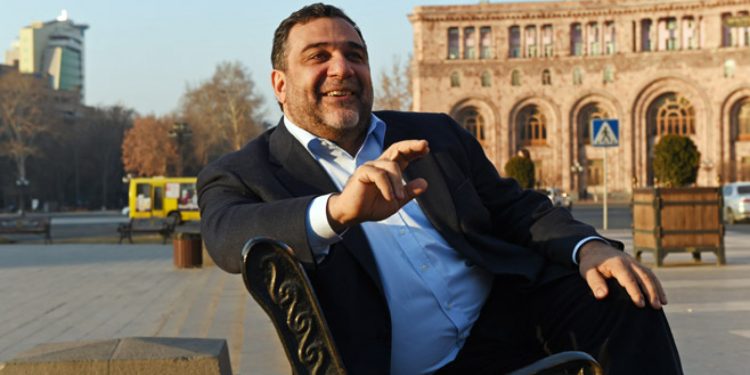
Azerbaijan Grows Wary of Russian Oligarch Vardanyan’s True Intentions in Karabakh
Azerbaijan Grows Wary of Russian Oligarch Vardanyan’s True Intentions in Karabakh
On November 17, 2022, during a meeting with a European Union delegation led by Special Envoy for the Eastern Partnership Dirk Schuebel in Baku, Azerbaijani President Ilham declared, “We are ready to talk … with Armenians who live in Karabakh, not with those who have been sent from Moscow hiding in their pockets billions of stolen money from Russian people, like the man called ‘Vardanyan’ who was transferred there [Karabakh] from Moscow with a very clear agenda” (President.az, November 17, 2022).
In this, the Azerbaijani president was clearly asserting Baku’s position on Ruben Vardanyan, a Russian oligarch of Armenian descent, who amassed his wealth during the thriving “gangster capitalism” of post-Soviet Russia. Vardanyan was quite successful in setting up and becoming affiliated with some of the top companies in Russia, such as Troika Dialog, which organized the laundering of at least $9 billion from Russia (Aze.media, January 5).
In September 2022, Vardanyan made a surprise move by renouncing his Russian citizenship and landing in Russian-controlled Karabakh and since has become a source of irritation for Baku (Eurasianet, September 5, 2022). Although Aliyev personally complained about the Vardanyan case to his Russian counterpart Vladimir Putin in October 2022, the Kremlin leader alleged he knew nothing about the oligarch’s presence and activities in Karabakh (Haqqin.az, November 5, 2022).
Yet, despite Putin’s handwashing, the political elite and expert community in Azerbaijan have continued to label Vardanyan as “Moscow`s project” (Modern.az, November 3, 2022; Redaktor.az, November 5, 2022). The Azerbaijani government has condemned Vardanyan’s appointment as the so-called “state minister” of separatist Karabakh as a ploy by the Kremlin to gain influence in the region (Meduza, February 7). Aliyev, too, has continued his harsh rhetoric particularly against Moscow, whom he accused of inciting regional tensions by dispatching the Russian oligarch (Azernews, November 25, 2022).
Some in Baku believe that one reason for Vardanyan`s unexpected relocation to Karabakh could be related to his plan for avoiding the Western sanctions imposed against a number of Russian oligarchs (Azernews, January 17). Although included on a sanctions list by the United States (Congress.gov, January 19, 2022), the Russian oligarch managed to slip out of it later. However, Ukraine has not forgotten about Vardanyan and has sanctioned him for being in “top management of the backbone Russian company, which is involved in material (transport, logistics and other) support of actions that undermine or threaten the territorial integrity, sovereignty and independence of Ukraine” (Sanctions.nazk.gov.ua, accessed February 11).
Apart from the alleged ambition of escaping sanctions, Vardanyan, as the general consensus in Azerbaijan concludes, was sent to Karabakh with a certain agenda, at exactly the moment when the situation around Karabakh was more or less favoring Azerbaijan (Eurasianet, January 13). Weakened by the Second Karabakh War, Yerevan, the traditional patron of Karabakh`s Armenian community, had de facto begun outsourcing the process of peace negotiations to the relevant Azerbaijani and Russian parties. As a result, Baku held the strong expectation that Armenia would formally accept Karabakh as part of Azerbaijan, and this view intensified in the latter half of 2022. Moreover, the past year witnessed some minimal, yet critical openings in communication between Baku and Khankendi, with officials discussing and coordinating cooperation in areas such as water management and recovering the bodies of those killed in action during the 2020 war (Aze.media, August 26, 2022). Vitaly Balasanyan, a former warlord who used to serve as the head of the “national security council” of separatist Karabakh, coordinated this communication and allegedly met with the representatives of the Azerbaijani security services at least once (Radar.am, December 7, 2022).
Some on the Azerbaijani side have attributed the sudden cessation of engagement between Baku and separatist Karabakh (which was seen in Baku as the initial steps for the region’s eventual reintegration into the country) to Vardanyan’s arrival in the region. More precisely, the Russian oligarch is accused of being directed by Moscow, whose regional influence has diminished. In this, the Kremlin might hope to impede communication between Baku and Khankendi in hopes of preserving Russia’s mitigation and peacekeeping roles in the region (Commonspace, December 19, 2022).
Azerbaijan also alleges that one of Vardanyan’s primary missions is to elevate the unrecognized “Nagorno-Karabakh Republic” as a subject for international consideration. Having used his personal and business ties with international media outlets, celebrities and socialites, Vardanyan has been quite vocal, especially since the standoff along the Lachin road began. Even though the crisis in the Lachin Corridor, which is ongoing due to the Karabakh issue, kicked off with an environmental agenda, one demand of the Azerbaijani side is related to Vardanyan. More precisely, Baku insists that Vardanyan end his “criminally adventurous” activity and leave the region as soon as possible for the sake of positive developments in the region (Azernews, December 23, 2022). Meanwhile, the Azerbaijani expert community and media are calling for Western sanctions against the Russian tycoon, who is “hiding in Azerbaijan behind the backs of Russian peacekeepers” (Aze.media, January 5).
Perhaps Karabakh only serves as a springboard for Vardanyan, whose ultimate destination could be Armenia. Since the end of the Second Karabakh War, the oligarch has declared several times that he would be ready to assume leadership positions in Armenia (RBC, November 26, 2021; Azatutyun, September 3, 2022). Contemporary political culture in Armenia has produced a similar pattern whereby the leaders in separatist Karabakh later join domestic politics and assume loftier positions in Armenia. Such a scenario would almost assuredly be approved by Moscow, which could be interested in implanting its protégé as a de facto ruler in Armenia, perhaps inspired by the Georgian case.


